 Software Tutorial
Software Tutorial
 Office Software
Office Software
 Excel workbook cannot be moved or copied? Let's see if it's due to these two reasons
Excel workbook cannot be moved or copied? Let's see if it's due to these two reasons
Excel workbook cannot be moved or copied? Let's see if it's due to these two reasons
php editor Xinyi found that sometimes in Excel, you may encounter a situation where the workbook cannot be moved or copied. There are usually two main reasons for this problem. One is that the workbook may be protected, and the other is that the Excel application may be locked. Next, let us explore these two reasons together to solve the problem of Excel workbooks unable to be moved or copied.
Excel tables are divided into workbooks and worksheets. A workbook is the entire file, and a worksheet is a single table in the workbook.
Worksheets can be easily moved or copied, and the same operations can even be performed on worksheets between different workbooks. If you encounter an inoperable situation, it is usually due to two possible reasons. Check these two causes and you can find the solution to the problem.
Cause 1: The Excel workbook is not opened at the same time
If there are two Excel sheets, and you want to copy or move the worksheet of one of them to another workbook, you need to open both Excel sheets at the same time.
For example, if you want to move and copy the "SheetA" worksheet of Excel "Sheet 2" to "Sheet 1", you need to open both Excels at the same time.
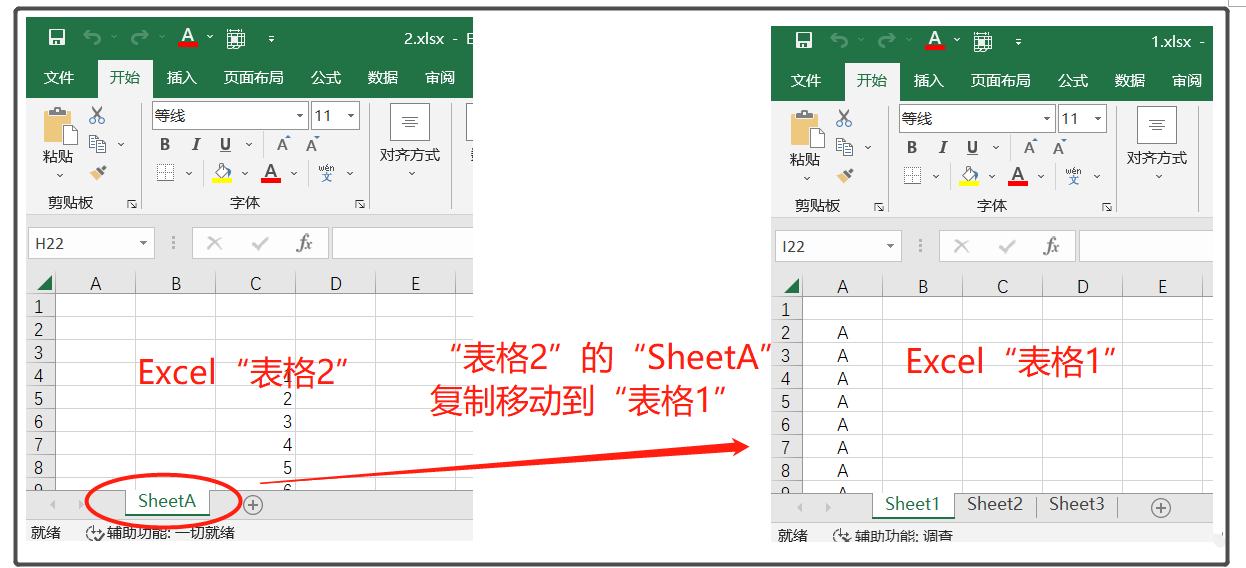
Then right-click on "SheetA" of "Sheet 2" and select the [Move or Copy] option.
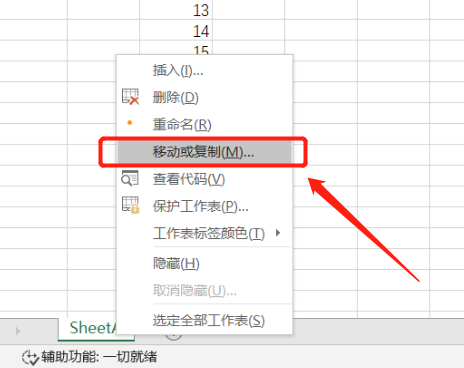
After the dialog box pops up, click the arrow drop-down list on the right side of the [Workbook] option, and select the workbook you want to move to. (Excel must be opened to be displayed here)
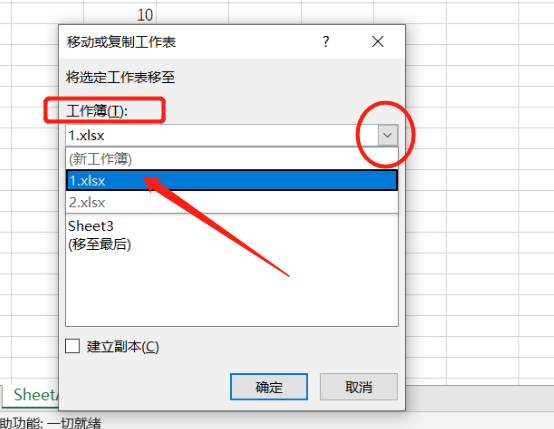
After selecting, you can also choose where to place the worksheet after moving to the new workbook in the [Before selected worksheet below] option.
If you need to copy and move the worksheet, please check [Create a copy]; if you only move it, there is no need to check it.
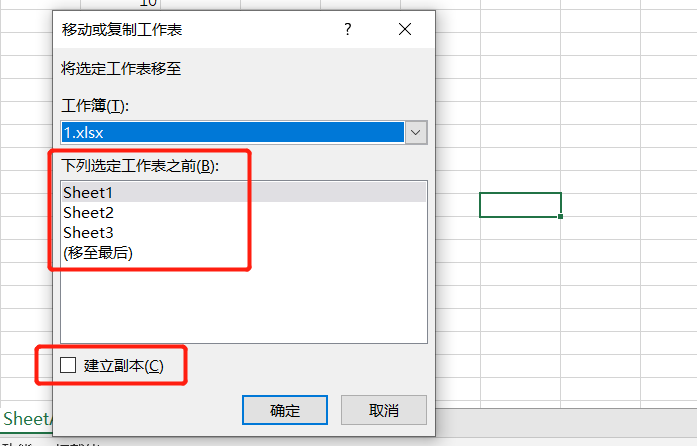
After completing the above operations, the worksheet will be moved to the specified location in the new workbook.
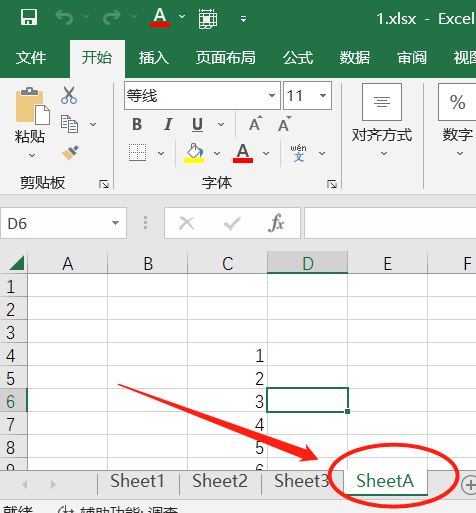
Cause 2: The workbook of the Excel spreadsheet is set to "restriction protection"
Excel tables can be set to "Protect Workbook". After setting, no matter whether it is a single Excel table or each worksheet between multiple Excels, it cannot be edited and changed at will.
As shown below, in a single Excel table, if you want to edit each worksheet, you will find that not only cannot "move or copy", but also a series of operations such as deleting, inserting new worksheets, renaming, etc. cannot be selected. The options are The gray state cannot be clicked.
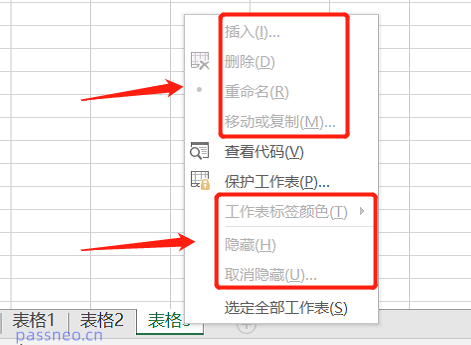
Two Excel tables, as long as one table has "restriction protection" set, it cannot be "moved or copied". During the operation, a dialog box will pop up, prompting "The workbook is protected and cannot be changed".
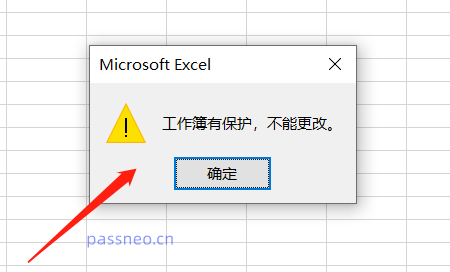
So, if the above situation occurs, we need to lift the "restriction protection" of the Excel table so that the workbook can be "moved or copied" .
How to remove the restriction? Select [Protect Workbook] in the [Review] list in the menu directory of the Excel table. After the dialog box pops up, enter the originally set password in the password field. The protection of the Excel workbook will be lifted, and various edits can be performed.
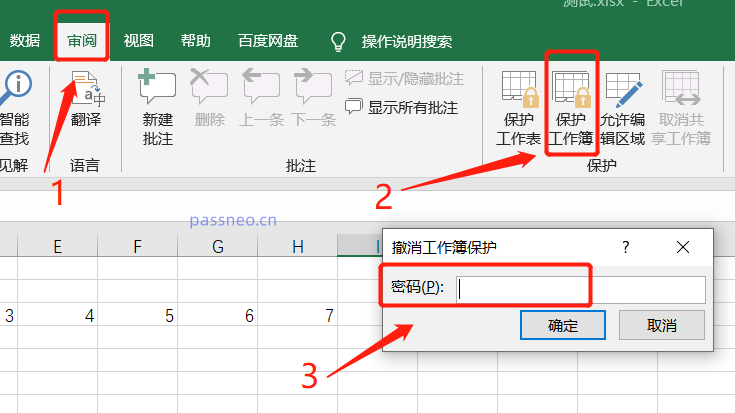
How to remove the "restriction protection" of an Excel workbook if you forget your password? There is no "forgot password" option in the Excel table. If there is no password, we might as well use other tools, such as the Pepsi Niu Excel Password Recovery Tool, to directly remove the "restricted password" from the Excel workbook.
In the tool, select the [Unrestriction] module and import the Excel table.
Tool link: Pepsi Niu Excel Password Recovery Tool
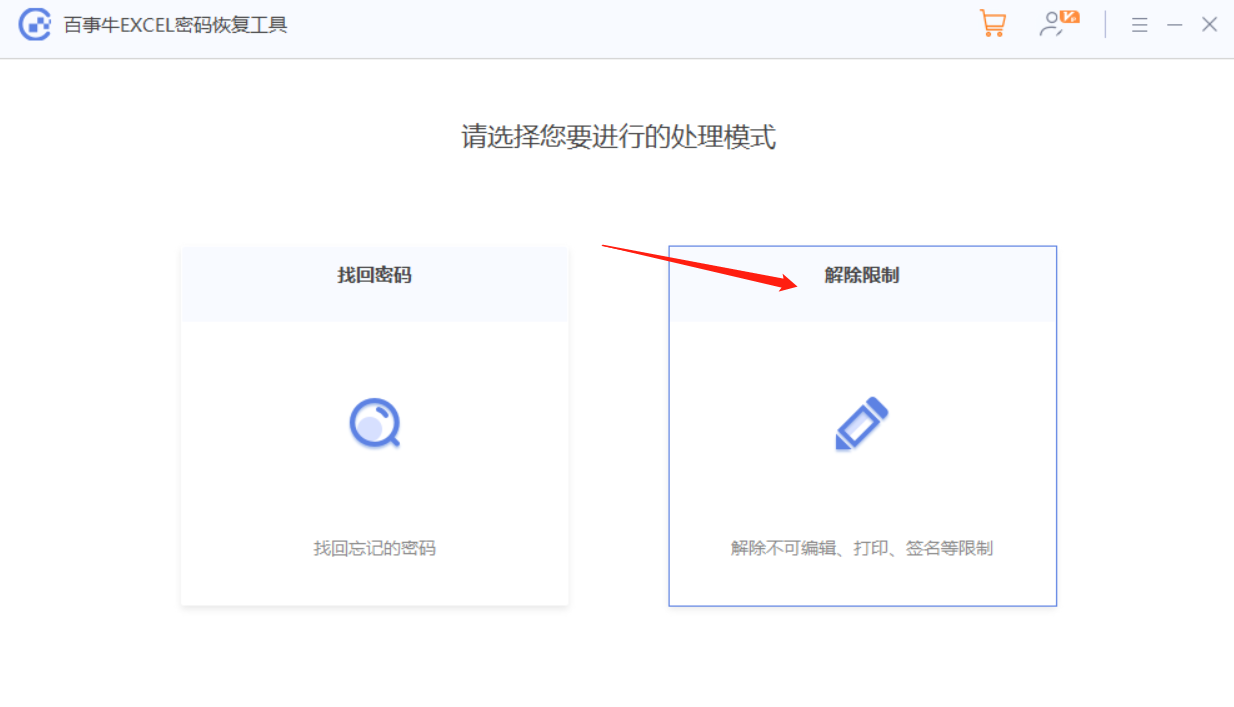
The above is the detailed content of Excel workbook cannot be moved or copied? Let's see if it's due to these two reasons. For more information, please follow other related articles on the PHP Chinese website!

Hot AI Tools

Undresser.AI Undress
AI-powered app for creating realistic nude photos

AI Clothes Remover
Online AI tool for removing clothes from photos.

Undress AI Tool
Undress images for free

Clothoff.io
AI clothes remover

AI Hentai Generator
Generate AI Hentai for free.

Hot Article

Hot Tools

Notepad++7.3.1
Easy-to-use and free code editor

SublimeText3 Chinese version
Chinese version, very easy to use

Zend Studio 13.0.1
Powerful PHP integrated development environment

Dreamweaver CS6
Visual web development tools

SublimeText3 Mac version
God-level code editing software (SublimeText3)

Hot Topics
 1386
1386
 52
52
 5 Things You Can Do in Excel for the Web Today That You Couldn't 12 Months Ago
Mar 22, 2025 am 03:03 AM
5 Things You Can Do in Excel for the Web Today That You Couldn't 12 Months Ago
Mar 22, 2025 am 03:03 AM
Excel web version features enhancements to improve efficiency! While Excel desktop version is more powerful, the web version has also been significantly improved over the past year. This article will focus on five key improvements: Easily insert rows and columns: In Excel web, just hover over the row or column header and click the " " sign that appears to insert a new row or column. There is no need to use the confusing right-click menu "insert" function anymore. This method is faster, and newly inserted rows or columns inherit the format of adjacent cells. Export as CSV files: Excel now supports exporting worksheets as CSV files for easy data transfer and compatibility with other software. Click "File" > "Export"
 How to Use LAMBDA in Excel to Create Your Own Functions
Mar 21, 2025 am 03:08 AM
How to Use LAMBDA in Excel to Create Your Own Functions
Mar 21, 2025 am 03:08 AM
Excel's LAMBDA Functions: An easy guide to creating custom functions Before Excel introduced the LAMBDA function, creating a custom function requires VBA or macro. Now, with LAMBDA, you can easily implement it using the familiar Excel syntax. This guide will guide you step by step how to use the LAMBDA function. It is recommended that you read the parts of this guide in order, first understand the grammar and simple examples, and then learn practical applications. The LAMBDA function is available for Microsoft 365 (Windows and Mac), Excel 2024 (Windows and Mac), and Excel for the web. E
 How to Create a Timeline Filter in Excel
Apr 03, 2025 am 03:51 AM
How to Create a Timeline Filter in Excel
Apr 03, 2025 am 03:51 AM
In Excel, using the timeline filter can display data by time period more efficiently, which is more convenient than using the filter button. The Timeline is a dynamic filtering option that allows you to quickly display data for a single date, month, quarter, or year. Step 1: Convert data to pivot table First, convert the original Excel data into a pivot table. Select any cell in the data table (formatted or not) and click PivotTable on the Insert tab of the ribbon. Related: How to Create Pivot Tables in Microsoft Excel Don't be intimidated by the pivot table! We will teach you basic skills that you can master in minutes. Related Articles In the dialog box, make sure the entire data range is selected (
 If You Don't Use Excel's Hidden Camera Tool, You're Missing a Trick
Mar 25, 2025 am 02:48 AM
If You Don't Use Excel's Hidden Camera Tool, You're Missing a Trick
Mar 25, 2025 am 02:48 AM
Quick Links Why Use the Camera Tool?
 Use the PERCENTOF Function to Simplify Percentage Calculations in Excel
Mar 27, 2025 am 03:03 AM
Use the PERCENTOF Function to Simplify Percentage Calculations in Excel
Mar 27, 2025 am 03:03 AM
Excel's PERCENTOF function: Easily calculate the proportion of data subsets Excel's PERCENTOF function can quickly calculate the proportion of data subsets in the entire data set, avoiding the hassle of creating complex formulas. PERCENTOF function syntax The PERCENTOF function has two parameters: =PERCENTOF(a,b) in: a (required) is a subset of data that forms part of the entire data set; b (required) is the entire dataset. In other words, the PERCENTOF function calculates the percentage of the subset a to the total dataset b. Calculate the proportion of individual values using PERCENTOF The easiest way to use the PERCENTOF function is to calculate the single
 You Need to Know What the Hash Sign Does in Excel Formulas
Apr 08, 2025 am 12:55 AM
You Need to Know What the Hash Sign Does in Excel Formulas
Apr 08, 2025 am 12:55 AM
Excel Overflow Range Operator (#) enables formulas to be automatically adjusted to accommodate changes in overflow range size. This feature is only available for Microsoft 365 Excel for Windows or Mac. Common functions such as UNIQUE, COUNTIF, and SORTBY can be used in conjunction with overflow range operators to generate dynamic sortable lists. The pound sign (#) in the Excel formula is also called the overflow range operator, which instructs the program to consider all results in the overflow range. Therefore, even if the overflow range increases or decreases, the formula containing # will automatically reflect this change. How to list and sort unique values in Microsoft Excel
 How to Format a Spilled Array in Excel
Apr 10, 2025 pm 12:01 PM
How to Format a Spilled Array in Excel
Apr 10, 2025 pm 12:01 PM
Use formula conditional formatting to handle overflow arrays in Excel Direct formatting of overflow arrays in Excel can cause problems, especially when the data shape or size changes. Formula-based conditional formatting rules allow automatic formatting to be adjusted when data parameters change. Adding a dollar sign ($) before a column reference applies a rule to all rows in the data. In Excel, you can apply direct formatting to the values or background of a cell to make the spreadsheet easier to read. However, when an Excel formula returns a set of values (called overflow arrays), applying direct formatting will cause problems if the size or shape of the data changes. Suppose you have this spreadsheet with overflow results from the PIVOTBY formula,




